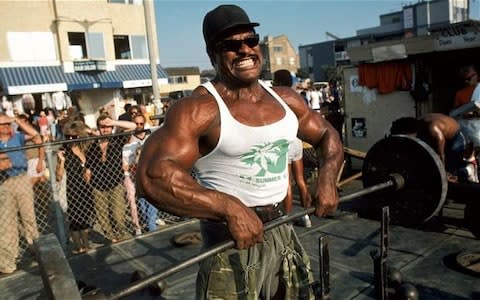What's better for fat loss: weight lifting or cardio work?

Once upon a time, if you asked a fitness professional how to lose weight, they'd reply with four simple words: get on a treadmill.
Cardiovascular work – long, slow, and (for some) boring – was the go-to option for anyone who needed to lose weight. Whether it was running, cycling, rowing or even walking, any exercise that tested your stamina over a long duration, rather than your strength over a short one, was seen as the fat person's friend.
Ask that same professional today, however, and the answer might not be so cut and dry - and here's why.
There's a raging debate in the fitness world about whether resistance training (weightlifting, to you and me) isn't actually more effective at bringing about fat loss than cardio work.
Annoyingly, as with many debates in my profession, there isn't a clear answer – we deal with too many personal variables and differing training regimes to ever settle on one option. Still, that doesn't stop me from having an opinion on the subject!

Before we get into which I prefer, it's important to understand the context of the question. Normally, people talk about wanting to achieve weight loss – but what they really mean is fat loss. They don't want to lose lean muscle, which would slow their metabolism and make them look less athletic; instead, they want to drop the blubber.
To always keep this context in mind, abide by the rule that ...
The maintenance of muscle mass should take precedence over the loss of bodyfat
Any training regime you embark on to lose fat and get lean should have been built with maintaining your lean muscle mass in mind.
Applying this to the cardio vs weightlifting issue, here's how the two compare:
Cardio
Pros
Very high calorie burn during session (falls off shortly after)
Low barrier to entry, many different activities can be incorporated
Excellent low intensity options for fat loss i.e walking
Little need for rest in comparison to weight training
Cons
Most people will use running as default cardio, but over running is a common problem, resulting in injuries and strains
Difficult for very unfit people to get into, excepting at very low intensity
Moderate to intense sustained cardio is not ideal for hormone balance, especially for those with high cortisol levels (a sign of tiredness and/or stress)
Extremely difficult to create a balanced physique through cardio alone
Quick Tip: Sprinting is a form of cardiovascular training that not only delivers all of the benefits of traditional cardio training but can also help burn additional calories for days after training and arguably even promote an anabolic response.
Weight Training
Pros
Increases muscle mass quickly
Causes a sustained spike in metablism, which means you burn calories long after the exercise is over
Low barrier to entry for the very unfit
Offers the ability to grow muscle and loss fat simultaneously
Cons
Higher barrier to recovery (e.g a four-hour walk is great whereas a four-hour weight session would be counter productive)
Lower caloric burn in comparison to cardio (minute by minute, not over time)
Lots of bad information on the market, leading to poor results
Can increase hunger significantly, so discipline with diet becomes a factor in success
So, which would I choose? Easy: weight training.
Weight training simply offers most of the health benefits of cardio, while most of the fat loss benefits of cardio can be achieved simply through reducing caloric intake.
However ... that does not mean I would suggest you design a fat loss program around weight training instead of cardio. It sounds obvious, but the question at the heart of the debate is false: no one has to do one or the other.
Instead, when my clients ask me to suggest a fat loss regime, I normally offer one of two programmes. The first is a heavy resistance focused approach to weights, with supplementary low intensity cardio work; the other is a hybrid training phase which incorporates high intensity resistance training and cardio into the same workout.
My best recommendation? Cycle between these approaches in six week phases until you are as lean and muscular as you desire.
Phase one: heavy weights
Focus on heavy weights, progressive load, high output cardio in the form of sprints and active recovery (LISS) between workouts.
Monday: Heavy Resistance training i.e 5 x5 or 4 sets of 6.
Squat
Bench
Row
Tuesday: LISS - e.g. walking 30-90 minutes
Wednesday: Heavy Resistance training i.e 5 x5 or 4 sets of 6.
Deadlift
Military Press
Upright Row
Thursday: LISS - e.g. walking 30-90 minutes
Friday: Sprint Training Session (outdoor track or hill session)
Saturday: Rest / Lifestyle activity
Sunday: Rest / Lifestyle activity
Nutrition: as a general rule, go for break even TDEE calories on your resistance training days and -10% on resting and LISS days.
Phase Two: hybrid training
Focus on short, highly intensive resistance based hybrid training sessions with adequate recovery between training sessions.
Monday: Kettlebell Complex
6 x One Arm Swing, Clean, Snatch, Jerk, Clean + Press
Then change arms.
Perform complex three times with one minute rest between complexes.
Tuesday: Rest
Wednesday: Escalating Density Training Workout
12 Minute timer countdown:
12 x Clean + Press
12 x Double Hand Kettlebell Swing
6 x Burpee
Thursday: Rest
Friday: Tabata Training (20 seconds work vs 10 seconds rest x 8)
1. Shadow Boxing
2. Shuttle Run
3. Box Jump
4. Bent to straight arm plank w/push up.
Saturday: Lifestyle Activity (e.g. walk, cycling)
Sunday: Lifestyle Activity
Nutrition: As a general rule go for break even TDEE on training days and -20% on resting days.
Scott Laidler is a personal trainer and personal development coach based in London. Contact Scott at www.scottlaidler.com for personal training and online fitness coaching


 Yahoo News
Yahoo News 
